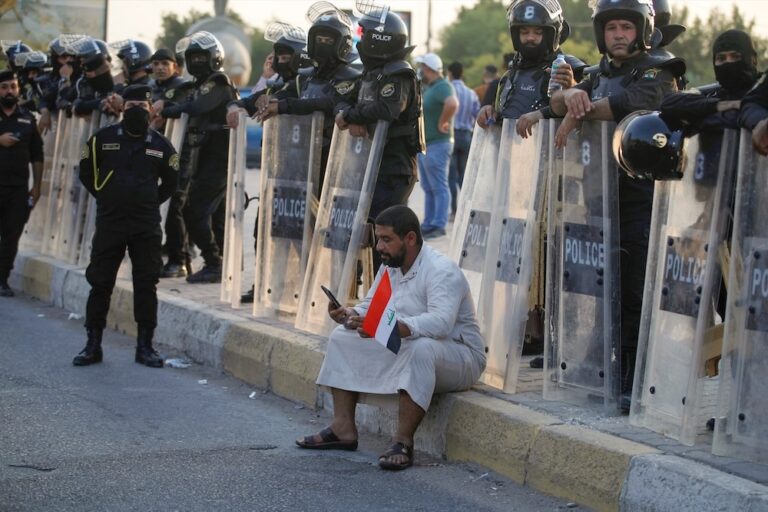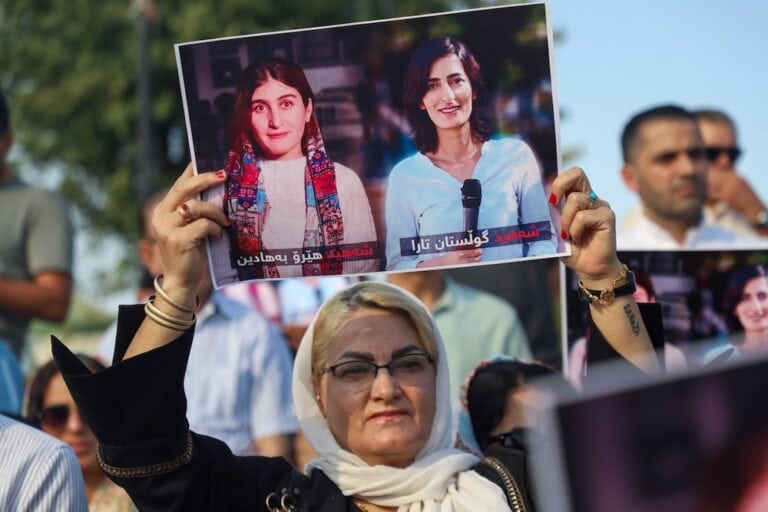The Kurdistan Regional Government promised a new era of freedom for Iraqi Kurds, but it seems no more respectful of Kurdish rights to free speech than the government that preceded it, said Human Rights Watch.
(Human Rights Watch/IFEX) – New York, May 24, 2011 – Kurdistan regional government officials and security forces are carrying out a growing assault on the freedom of journalists to work in Iraqi Kurdistan, Human Rights Watch said today. Regional officials should stop repressing journalists through libel suits, beatings, detentions, and death threats, Human Rights Watch said.
Kurdistan authorities have repeatedly tried to silence Livin Magazine, one of Iraqi Kurdistan’s leading independent publications, and other media. The international community should end its silence and condemn these widening attacks, Human Rights Watch said.
“The Kurdistan Regional Government promised a new era of freedom for Iraqi Kurds, but it seems no more respectful of Kurdish rights to free speech than the government that preceded it,” said Sarah Leah Whitson, Middle East director at Human Rights Watch. “In a time when the Middle East is erupting in demands to end repression, the Kurdish authorities are trying to stifle and intimidate critical journalism.”
On May 17, 2011, the Kurdistan Democratic Party (KDP) of regional president Massud Barzani brought a defamation lawsuit against the Livin editor-in-chief, Ahmed Mira, for publishing an article about an alleged plot by the KDP and its ruling alliance partner, the Patriotic Union of Kurdistan (PUK), to assassinate opposition leaders. According to court documents obtained by Human Rights Watch, the KDP is seeking total damages of one billion dinars (US$864,000) and an order to shut down the magazine by revoking its license.
The court documents say the party is suing Mira because the Livin article “not only has no basis in truth but is a threat to national security [and] a violation to the dignity and glory and the great achievements” of Iraqi Kurdistan.
Earlier in May, the Iraqi president, Jalal Talabani, the PUK leader, filed his own lawsuit over the same article. Mira told Human Rights Watch that, as a result, police detained him and a Livin reporter, Zhyar Mohammed, for five hours on May 5.
“Such libel suits by Kurdistan government officials are nothing more than a thinly-veiled effort to punish critics and create an atmosphere of fear and self-censorship,” Whitson said. “The attacks by Barzani and his colleagues on independent journalists do more to undermine Kurdish ‘dignity’ and ‘glory’ than anything in the media reports.”
A Livin reporter told Human Rights Watch that when he called Sheikh Jaffar Mustafa, Minister of Peshmerga (Kurdistan security forces), on April 24, Mustafa threatened Livin’s editor, Mira, with death. The reporter had called Mustafa and taped the conversation because he wanted to get an official comment on an unrelated matter. The reporter said that Mustafa was upset over an unflattering article in the magazine that compared Mustafa to the Israeli defense minister, Ehud Barak. Mira said he decided to report the threat to the regional government’s prime minister rather than make it public or go to the police, which he believed would be ineffectual and put him at further risk.
“Immediately after the death threat by Sheikh Jaffar Mustafa, I informed KRG Prime Minister Dr. Barham Salih and asked for his help,” he said. “I have a recording of the threat and can prove it, but unfortunately, the prime minister has not made any efforts to investigate a death threat by a member of his own cabinet.” Mira said that, as a result, he published an article about the death threat on May 7.
Human Rights Watch called on the Kurdistan Regional Government (KRG) to investigate the alleged death threats against Mira, and to remove Mustafa from his position and prosecute him in a court of law if the allegation is found to be substantiated.
Livin, an independent magazine established in 2002 in Sulaimaniya that publishes three times a month, is widely circulated in Kurdistan and frequently publishes articles openly critical of the two ruling parties. Several of its writers have also been threatened or arrested or have fled the country. In 2008, Soran Mama-Hama, an investigative reporter with Livin, was assassinated outside his parents’ home in a Kurdish-controlled section of Kirkuk after writing about the suspected involvement of Kurdish officials in prostitution rings.
Kurdistan authorities have carried out a series of attacks on protest organizers and other journalists since quashing protests in Sulaimaniya on April 18. The threat of attacks and arrests has sent some into hiding.
In Sulaimaniya on the night of May 11, security forces detained and beat a Kurdistan News Network reporter, Bryar Namiq, breaking his hand. Namiq told Human Rights Watch on May 16:
After shots were fired near the parliament office, I went there to cover the incident and asked a patrol of PUK forces what had happened. Suddenly, six men in civilian clothes appeared and attacked me, took my mobile phone and camera, and brought me to the front of the house of a security director of the city. There, many security forces insulted me and beat me, and I heard one of them ask the officer if he could kill me. My head was covered and I was put into the back of a car and dumped in a different part of the city.
Two journalists, afraid to be named for fear of reprisal, told Human Rights Watch on May 18 that eight men in civilian clothes chased after them in late April in Arbil. The men appeared in two vehicles on the street just before the journalists were supposed to meet with a regional official who had asked for a meeting with some members of the media. The journalists believe that the men were plainclothes security forces who were aware of the meeting and were trying to kidnap them.
Soran Umar, a protest organizer and freelance journalist, has been in hiding since April 19. “I have not slept at home since then,” he told Human Rights Watch on May 17. “My sin is that I am criticizing the undemocratic acts of KRG and the two ruling parties, that is all. The security forces have tried to kidnap me, and they have ordered my arrest. They even tried to kidnap my son.”
A freelance photojournalist, Zmnako Ismail, who actively covered the Sulaimaniya demonstrations, is also in hiding. “I have been followed many times, and I am in danger of being arrested and beaten,” he told Human rights Watch on May 14. “That’s why I only travel in one taxi, with a driver I trust, and can’t go to public places. My Facebook page and email accounts have also been hacked, and I cannot use them. This has happened to others involved in the demonstrations.”
Another journalist who has written articles critical of the regional leadership and has received several anonymous threats told Human Rights Watch in late April, “Many of my Facebook friends told me that security forces called and threatened them, saying they had better take me off their Facebook ‘friend list,’ and many of them have.”
Since February 17, the local press freedom group, Metro Center to Defend Journalists, has documented more than 200 cases of attacks and harassment of Kurdish journalists, and Reporters Without Borders has tallied 44 physical attacks against media workers and outlets and 23 arrests.
( . . . )


